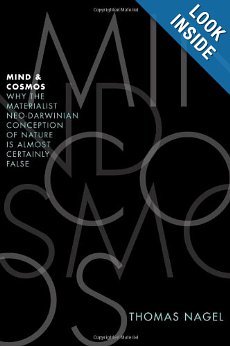Michael J. Behe's Blog, page 589
February 25, 2017
It’s amazing how much good science started out as mistakes…
 Says Eric Scerri at Los Angeles Times:
Says Eric Scerri at Los Angeles Times:
Detailed case studies on the history of chemistry and physics show that the role of genius in advancing those fields — and even the role of rationality — is overstated. Rather than a hyper-intellectual, alien activity practiced by a remote priesthood, science is hit and miss, the ever-changing product of less-than-brilliant people, just like every other human activity.
…
In the 1910s, the English mathematical physicist John Nicholson published a number of articles in which he proposed that several proto-elements (his term) existed in outer space and were the basis of our familiar terrestrial elements. Their presence in a number of celestial bodies, he claimed, enabled him for the first time to do successful calculations on the light reaching us from the Orion nebula and the solar corona.

What’s hot? What’s not?/Niklas Bildhauer, Wikimedia
At first his findings seemed to hold up, but it soon became clear that the calculations were incorrect or the result of numerological speculations. Nevertheless in the course of his work Nicholson also proposed that the angular momentum of electrons circulating around a nucleus should be “quantized,” meaning that it could only occur with specific definite values. This notion would set Danish physicist (and, ultimately, Nobel Prize winner) Niels Bohr off on his theory of the structure of the hydrogen atom. From that, quantum mechanics and all the technological applications based on it — including lasers and semiconductors — would follow.More.
Mistakes, it seems, will only get us so far. The rest is meticulous slogging.
See also: Bad science: Is psychology just a scapegoat?
Follow UD News at Twitter!
Copyright © 2017 Uncommon Descent . This Feed is for personal non-commercial use only. If you are not reading this material in your news aggregator, the site you are looking at is guilty of copyright infringement UNLESS EXPLICIT PERMISSION OTHERWISE HAS BEEN GIVEN. Please contact legal@uncommondescent.com so we can take legal action immediately.
Plugin by Taragana
February 23, 2017
Origin of life: Do L-form bacteria hint at origin of primordial cells?
 From Suzan Mazur at Huffington Post, a chat with molecular biologist Jeffrey Errington about L-form bacteria, which lack a strong cell wall:
From Suzan Mazur at Huffington Post, a chat with molecular biologist Jeffrey Errington about L-form bacteria, which lack a strong cell wall:
Jeffery Errington: I became interested in the problem because I was aware of L-forms from the scientific literature of the 1950s and 60s. Curiously, however, right around the end of the 1970s or so, publishing on L-forms just sort of petered out. I haven’t really been able to get to the bottom of exactly why that happened.
…
Suzan Mazur: How pervasive are L-forms in nature now and earlier in evolution?
Jeffery Errington: There are a few bacteria that are naturally cell wall-deficient, like Mycoplasma, which is a pathogen, and Phytoplasma, which inhabits plants. They’re both cell-wall deficient, but if you look at the evolutionary history of these organisms, it’s quite clear they’re derived from much more ancient bacteria – probably resembling modern clostridia, which have conventional cell walls. So the thinking now is that this is retrograde evolution — Mycoplasma lost the ability to make a wall while evolving into specialized pathogens.
Suzan Mazur: Are you saying that this group, Mycoplama, Phytoplasma and related species are the only cell-deficient organisms that now exist naturally – without being generated in the lab?
Jeffery Errington: No. It’s clear that there are L-forms in nature. What I’m saying is that an ancient ancestor of modern Mycoplasma probably started out as an L-form in the distant past and then evolved down a side track becoming a pathogen, meanwhile losing many genes needed for life outside the specialized environment in the host.
…
Suzan Mazur: Some L-forms can slip back and forth from walled to wall-less states, does that particular talent indicate the organisms are more evolved or less evolved than other life forms?
Jeffery Errington: This ability to change between the two states begins to seem quite a general property of bacteria, which to me suggests that this is a very ancient trait that’s been retained by modern bacteria because it has adaptive significance in situations that are not especially rare.
For example, if the cells experience conditions where lots of osmolytes [like sucrose in plant sap] are present, giving a sufficiently high osmotic pressure around the cell – the organism doesn’t really need its cell wall, and in principle it can slip into the L-form state, dispensing with the wall. We may have missed this in the past due to microbiologists historically using a particular kind of agar [gelatinous substance derived from red algae] to grow bacteria, which is usually incompatible with the growth of L-forms. More.
So then the ability to switch back and forth is a form of stasis from earliest times?
Then perhaps Craig Venter is right; there is not a single origin of life. Note what Errington says about archaea: “I think it’s curious, really curious that the archaea and the bacteria have a fundamental difference in terms of their cell development structure. It reflects also the very fundamental differences in the way they replicate, transcribe and translate DNA.”
 Note: Mazur published a book of interviews on the origin of life, Origin of Life Circus (2015).
Note: Mazur published a book of interviews on the origin of life, Origin of Life Circus (2015).
See also: Lecture: Bacterial cell walls, antibiotics and the origins of life
and
What we know and don’t know about the origin of life
Follow UD News at Twitter!
Copyright © 2017 Uncommon Descent . This Feed is for personal non-commercial use only. If you are not reading this material in your news aggregator, the site you are looking at is guilty of copyright infringement UNLESS EXPLICIT PERMISSION OTHERWISE HAS BEEN GIVEN. Please contact legal@uncommondescent.com so we can take legal action immediately.
Plugin by Taragana
Marchin,’ marchin’: Most scientists can’t replicate peers’ studies?
From Tom Feilden at at BBC:
From his lab at the University of Virginia’s Centre for Open Science, immunologist Dr Tim Errington runs The Reproducibility Project, which attempted to repeat the findings reported in five landmark cancer studies.
…
After meticulous research involving painstaking attention to detail over several years (the project was launched in 2011), the team was able to confirm only two of the original studies’ findings.
…
Writing in the latest edition of Nature, [Edinburgh neuroscientist Prof Malcolm Macleod] outlines a new approach to animal studies that calls for independent, statistically rigorous confirmation of a paper’s central hypothesis before publication.
“Without efforts to reproduce the findings of others, we don’t know if the facts out there actually represent what’s happening in biology or not.” More.
As we’ve said elsewhere, science’s big problems today are on the inside, not the outside. March if you need the exercise and the friendship, but the big problems are actually back at the desk. What, exactly, is the public supposed to do?
See also: Peer review “unscientific”: Tough words from editor of Nature
Follow UD News at Twitter!
Copyright © 2017 Uncommon Descent . This Feed is for personal non-commercial use only. If you are not reading this material in your news aggregator, the site you are looking at is guilty of copyright infringement UNLESS EXPLICIT PERMISSION OTHERWISE HAS BEEN GIVEN. Please contact legal@uncommondescent.com so we can take legal action immediately.
Plugin by Taragana
Rob Sheldon: Are the seven new planets, three “habitable,” just hype? Read the fine print.

artist’s impression of surface of TRAPPIST-1f/NASA/JPL-Caltech
Yesterday, NASA reported a record-breaking discovery of seven new Earth-size planets around a single star, three in the habitable zone:
The discovery sets a new record for greatest number of habitable-zone planets found around a single star outside our solar system [TRAPPIST-1]. All of these seven planets could have liquid water – key to life as we know it – under the right atmospheric conditions, but the chances are highest with the three in the habitable zone.
“This discovery could be a significant piece in the puzzle of finding habitable environments, places that are conducive to life,” said Thomas Zurbuchen, associate administrator of the agency’s Science Mission Directorate in Washington. “Answering the question ‘are we alone’ is a top science priority and finding so many planets like these for the first time in the habitable zone is a remarkable step forward toward that goal.”More.
The planets are about forty light years from Earth, in Aquarius.
Our physics colour commentator Rob Sheldon offers,
The sun that they orbit is a brown dwarf. It puts out 0.04% of the heat that our own Sun does. In order to be in the “habitable zone” where water is liquid, they orbit at 0.01 AU from their sun, where Earth is 1AU and Mercury about 0.3 AU from our sun. A “year” on these planets is 1 day, 2 days, 3 days, 6 days for the inner few. They are so close to the “brown dwarf” sun that they experience huge tidal forces that force one side of the planet to stay facing their sun. They are also so close that they are exposed to all the “flare particles” released from magnetic activity, so it would suggest one side of each “planet” is scorched and radioactive, while the other side is figid and frozen. Not exactly hospitable.
They looked for signatures of Hydrogen and Helium and saw none, which suggests that none of the planets is a “gas giant” like Jupiter, and also none of them has an extended oxygen or CO2 atmosphere like Earth or Venus. Many such “solar systems” with “earthlike” planets around “brown dwarf” planets have been seen already, with little hope of life on them. But what makes this one special is that there are 7 such planets all strung out in a line. The “perhaps there’s life” is a red herring to make this newsworthy.
See also: Religion and ET: What’s wrong with science writing today
Follow UD News at Twitter!
Copyright © 2017 Uncommon Descent . This Feed is for personal non-commercial use only. If you are not reading this material in your news aggregator, the site you are looking at is guilty of copyright infringement UNLESS EXPLICIT PERMISSION OTHERWISE HAS BEEN GIVEN. Please contact legal@uncommondescent.com so we can take legal action immediately.
Plugin by Taragana
Vid: Tom Bethell on authoritarian science
From David Klinghoffer at Evolution News and Views:
We’re looking forward to the March for Science this coming April 22, planned for Washington, DC, and with satellite marches across the country. If you’ve read about it, it promises to be a screechy and politicized protest against questioning orthodox scientific views or criticizing scientists.
Scientists, as you know, are now held by many to enjoy a status granting them permanent immunity from criticism (much like the media, judges, and intelligence officials). In this way, scientific authority transmutes into scientific authoritarianism. Meanwhile we’re told it’s the skeptics on Darwinism and other scientific ideas, perpetually dodging threats to their careers and reputations, that we are supposed to fear and revile. More.
It’s increasingly obvious is that the enemies of science are within: People who can’t stand being questioned in fields that thrive on questions are like comedians who can’t stand a tough audience. Prophecy: It won’t sell.
Rachel Adams has produced a video that captures the approach taken by Tom Bethell’s Darwin’s House of Cards, Iconoclast, linked below.
Screech-free. (No, really.)
See also: Darwin fans: We censor in order to oppose censorship The group sounds like a treat. Here is their Kids’ Right to Read project. … So the smart high schooler can read Michael Behe’s Edge of Evolution at school if she wants? Wait, what was that smashing noise out in the hall? (muffled high-pitched screams… )
Tom Bethell muses on Evolution Weekend
and
When genome mapper Craig Venter made clear he doubted universal common descent… Did you ever hear this story? Wonder why he thought that?
Follow UD News at Twitter!
Copyright © 2017 Uncommon Descent . This Feed is for personal non-commercial use only. If you are not reading this material in your news aggregator, the site you are looking at is guilty of copyright infringement UNLESS EXPLICIT PERMISSION OTHERWISE HAS BEEN GIVEN. Please contact legal@uncommondescent.com so we can take legal action immediately.
Plugin by Taragana
Darwin fans: We censor in order to oppose censorship
Of course. What other motive could there be? Re the South Dakota academic freedom bill, David Klinghoffer offers at Evolution News & Views :
In a surreal move, a group called the National Coalition Against Censorship has plunged into the South Dakota situation to demand continued restraints on teachers and their academic freedom — in other words, censorship.
They complain that SB 55 would “remov[e] accountability in science education.” “Accountability” there would seem to mean instructors being vulnerable to career retaliation for teaching critical thinking skills to science students. These “anti-censorship” proponents advocate retaining the option of punishing biology teachers for going off message on Darwinism.
They go on: “Essentially, [the bill] removes the restraints on teachers that prevents them from straying from professionally-developed science standards adopted by state educators.” The National Coalition Against Censorship favors keeping “restraints” on teachers firmly in place.More.
Oh wow. You mean, school boards don’t hire adults with good professional judgement? Teachers must be kept from “straying,” like prisoners on parole?
Darwinism is problem, but if anything like what we just heard is true, the system has bigger problems.
Actually, George (“1984”) Orwell explained it. These people form part of the outer party, dedicated to enforcing the government’s view in the name of intellectual freedom.
The group sounds like a treat. Here is their Kids’ Right to Read project.
The Kids’ Right to Read Project (KRRP) is a signature aspect of NCAC’s Youth Free Expression Program. KRRP offers support, education, and direct advocacy to people facing book challenges or bans in schools and libraries and engages local activists in promoting the freedom to read. It was co-founded with the American Booksellers for Free Expression and is supported in part by the Association of American Publishers and the Comic Book Legal Defense Fund.
So the smart high schooler can read Michael Behe’s Edge of Evolution at school if she wants? Wait, what was that smashing noise out in the hall? (muffled high-pitched screams… )
One wonders how many of the Coalition members are supported in whole or in part by the taxpayer. Just a question.
One possible response: Teachers should start talking about the work of non-Darwinian biologists and wait for local chuckleheads to jump up and down and scream that to even mention any other view than Darwin’ is censorship of Darwin.
See also: Gravy train wreck: No Free Lunch for Darwinism in Texas?
Follow UD News at Twitter!
Copyright © 2017 Uncommon Descent . This Feed is for personal non-commercial use only. If you are not reading this material in your news aggregator, the site you are looking at is guilty of copyright infringement UNLESS EXPLICIT PERMISSION OTHERWISE HAS BEEN GIVEN. Please contact legal@uncommondescent.com so we can take legal action immediately.
Plugin by Taragana
February 22, 2017
Video: Why Evolution is Different
While preparing a talk for May I created a video which I would like to share. The first 13 minutes are based more or less on an ENV post Why Should Evolutionary Biology be so Different? and the second part is based on Why Similarities Do Not Prove the Absence of Design.
This is a homemade, unpolished, video, but if anyone has the patience to watch the entire 21 minutes, I believe they will find it contains a powerful presentation of the evidence for intelligent design:
[There is a video that cannot be displayed in this feed. Visit the blog entry to see the video.]
Copyright © 2017 Uncommon Descent . This Feed is for personal non-commercial use only. If you are not reading this material in your news aggregator, the site you are looking at is guilty of copyright infringement UNLESS EXPLICIT PERMISSION OTHERWISE HAS BEEN GIVEN. Please contact legal@uncommondescent.com so we can take legal action immediately.
Plugin by Taragana
You Keep Using That Word
The March for Science is billing itself as “nonpartisan.” Here’s the first sentence of the second paragraph of their website:
We are scientists and science enthusiasts. We come from all races, all religions, all gender identities, all sexual orientations, all abilities, all socioeconomic backgrounds, all political perspectives, and all nationalities.
Yeah, that could have been written by someone at the RNC.
Inigo Montoya might say:
The whole purpose of the March for Science is to squelch opposition to certain dogmas that are currently fashionable among scientific elites. And I bet many of those same scientists would say that science is a self-correcting, ideology-free enterprise that prizes skepticism as one of its most important ideals. Well, if the attitude on display by the organizers of the March for Science is what they mean by “skepticism,” Inigo Montoya might say . . .
Copyright © 2017 Uncommon Descent . This Feed is for personal non-commercial use only. If you are not reading this material in your news aggregator, the site you are looking at is guilty of copyright infringement UNLESS EXPLICIT PERMISSION OTHERWISE HAS BEEN GIVEN. Please contact legal@uncommondescent.com so we can take legal action immediately.
Plugin by Taragana
Thomas Nagel: Daniel Dennett “maintaining a thesis at all costs” in Bacteria to Bach and Back
 Non-naturalist atheist philosopher Thomas Nagel, author of Mind and Cosmos, reviewing naturalist atheist philosopher Daniel Dennett’s Bacteria to Bach and Back at New York Review of Books:
Non-naturalist atheist philosopher Thomas Nagel, author of Mind and Cosmos, reviewing naturalist atheist philosopher Daniel Dennett’s Bacteria to Bach and Back at New York Review of Books:
For fifty years the philosopher Daniel Dennett has been engaged in a grand project of disenchantment of the human world, using science to free us from what he deems illusions—illusions that are difficult to dislodge because they are so natural. In From Bacteria to Bach and Back, his eighteenth book (thirteenth as sole author), Dennett presents a valuable and typically lucid synthesis of his worldview. Though it is supported by reams of scientific data, he acknowledges that much of what he says is conjectural rather than proven, either empirically or philosophically.
A question that occurs to the improperly educated mind is whether “reams of data” mean anything under the circumstances described.
For this part and much more, you will have to pay:
The trouble is that Dennett concludes not only that there is much more behind our behavioral competencies than is revealed to the first-person point of view—which is certainly true—but that nothing whatever is revealed to the first-person point of view but a “version” of the neural machinery. In other words, when I look at the American flag, it may seem to me that there are red stripes in my subjective visual field, but that is an illusion: the only reality, of which this is “an interpreted, digested version,” is that a physical process I can’t describe is going on in my visual cortex.
… And he asks us to do this because the reality of such phenomena is incompatible with the scientific materialism that in his view sets the outer bounds of reality. He is, in Aristotle’s words, “maintaining a thesis at all costs.” (paywall) More.
Isn’t that the purpose of the modern university system? We pay, they decide how we should think and live. What could go wrong with that?
See also: Human mind: “Dead Horse” Dennett kicks Darwin’s nag again
Thomas Nagel: “The intelligentsia was so furious [at him] that it formed a lynch mob”
Split brain does not lead to split consciousness
and
Would we give up naturalism to solve the hard problem of consciousness?
Follow UD News at Twitter!
Copyright © 2017 Uncommon Descent . This Feed is for personal non-commercial use only. If you are not reading this material in your news aggregator, the site you are looking at is guilty of copyright infringement UNLESS EXPLICIT PERMISSION OTHERWISE HAS BEEN GIVEN. Please contact legal@uncommondescent.com so we can take legal action immediately.
Plugin by Taragana
AM-Nat Biology Abstracts Posted
Just wanted to let everyone know that we have posted the abstracts for this weekend’s Alternatives to Methodological Naturalism in Biology conference online.
You can get the abstracts and sign up for the conference here.
Copyright © 2017 Uncommon Descent . This Feed is for personal non-commercial use only. If you are not reading this material in your news aggregator, the site you are looking at is guilty of copyright infringement UNLESS EXPLICIT PERMISSION OTHERWISE HAS BEEN GIVEN. Please contact legal@uncommondescent.com so we can take legal action immediately.
Plugin by Taragana
Michael J. Behe's Blog
- Michael J. Behe's profile
- 219 followers





